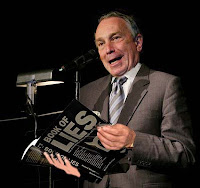The DOE has time and again claimed that education reform is necessary because they want only
"excellent teachers" to instruct the City's students. Of course the DOE is clueless to what an excellent teacher is. The DOE's real motive is their
"education on the cheap" policies. For Tweed an excellent teacher is an inexpensive and untenured teacher that will not be in the profession long enough to get a pension or retiree health benefits. In fact Mayor Bloomberg discounted teacher experience by saying teacher experience is not important to student learning. If the DOE really wanted the best teachers in the schools, the first thing they would do is allow principals to hire the
"best teachers" and not the cheapest teachers as they are forced to do now. Previously principals were able to hire the
"best teachers" because all teachers cost the same to the school. The result was that the principals could hire teachers who they believed would be best for the school's students. However, under Mayor Bloomberg's ex-Chancellor, Joel Klein, came
"fair student funding" that hamstrung principals in who they can hire.
Before
"fair student funding" fiasco teachers were units and schools could hire who they pleased as long as they didn't exceed the total units allocated to the school. Therefore, many principals would try to recruit more experienced teachers to instruct the school's students since they know that the
"best teachers" are experienced teachers. The result was that the better schools would end up with the excellent teachers, while the poorly preforming and ineptly Administrated schools would see a merry-go-round of "
newbie teachers" and poor student academic outcomes. The solution of this teacher inequality would have been to encourage experienced teachers to end their stellar careers at these struggling schools by giving them a monetary motive. Chancellor Rudy Crew, the last Chancellor that actually was an educator, came up with the Chancellor's District that paid teachers 15% more money to teach smaller classes in these struggling schools in return for a slightly longer day and with greater teacher resources. While it was not a complete success, it did bring experienced teachers to these schools and more importantly, did raise the academic achievement of the school's students. Unfortunately, the
Bloomberg/Klein Administration in 2003 put an end to the Chancellor's District and these struggling schools and their students were no longer exposed to these top quality experienced teachers. The result was a new merry-go-around of
"newbie teachers" and student academic outcomes plumeted. Now these schools are based upon a top-down imposed
"drill and kill" strategy that replaced real learning with mind-numbing test preparation. Is it any wonder that these struggling schools are either now closed or in danger of closing?
Once, the
"fair student funding" fiasco was implemented by Joel Klein's DOE, combined with the terrible 2005 contract that eliminated the requirement that all excessed teachers in a District must be placed before outside teachers can be hired, it became virtually impossible for a Principal to hire an experienced teacher without taking a significant budget hit. Even replacing one experienced teacher with another could be tricky budget wise since the original teacher's salary may have been
"grandfathered" while the replacement is not. This is especially true during the last few years with increasingly tight school budgets and DOE top-down requirements that schools spent a significant part of their budget for non-school based support systems such as the wasteful and unnecessary Children First Networks.

A prime example of the academic failure is the Bloomberg small schools that only seem to have
"newbie" and untenured teachers that leave the schools in three to five years. Many of these small schools are lead by
"Leadership Academy Principals" who have little classroom experience themselves and are encouraged by Tweed to hire the cheapest teachers to stretch their budget The result is that parents and students who like the idea of small learning communities, instead found large class sizes, a rigid curriculum, and worse, untested and inexperienced teachers who suffered from a steep learning curve when it came to curriculum knowledge and had poor classroom management skills. The over reliance of inexperienced teachers in these small schools hurt student academic achievement and collectively the Bloomberg small schools have terrible
"college and career readiness scores" to show for it, averaging an abysmal 10 7% compared to 20.7% for the large comprehensive high schools.
It is too bad that the non-educators at Tweed cannot recognize what good teaching is but what do you expect when eighteen of the twenty top people at Tweed never taught in the classroom themselves?
 In the ever continuing teacher evaluation system conflict between the DOE and the UFT. One aspect that both sides agree is the use of the New York State Value Added Measurement (VAM) algorithm to account for either 20% or 25% of the overall teacher evaluation. In a previous pilot study using the VAM in New York City's teacher data reports had resulted in errors as large as 87% for English and 75% for Math! Yet the State still insist to use this "junk science" to evaluate teachers. Unbelievable but true.
In the ever continuing teacher evaluation system conflict between the DOE and the UFT. One aspect that both sides agree is the use of the New York State Value Added Measurement (VAM) algorithm to account for either 20% or 25% of the overall teacher evaluation. In a previous pilot study using the VAM in New York City's teacher data reports had resulted in errors as large as 87% for English and 75% for Math! Yet the State still insist to use this "junk science" to evaluate teachers. Unbelievable but true.










































